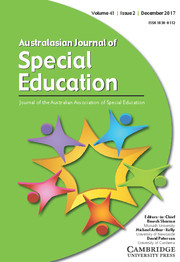Article contents
Profiling Transitions in Emotional Development for Students With Additional Learning Needs
Published online by Cambridge University Press: 02 March 2012
Abstract
The aim of the research described in this article was to build a protocol for describing students' development of emotional knowledge and understanding, and to tailor this to the requirements of assessing the progress of students with additional needs. The paper reports the establishment of such a developmental profile, using procedures for defining standards-referenced frameworks (Griffin, 2007) to create an observation questionnaire of students' emotional skills. This approach relies on the knowledge and collaboration of experienced teachers and researchers in the fields of special education and emotional development to establish an hypothesised framework of critical skills, observable behaviour statements, and developmental criteria that map qualitative transitions in student performance. The framework was subsequently validated against observation data gathered by teachers in 2007, from 77 Victorian government schools (21 mainstream, 56 special education) on 1597 students (3 to 18 years) with additional needs. Their responses were calibrated using partial credit item response modelling to empirically identify major transitions in students' emotional development and to establish the construct validity of the profile. In the area of students' emotional development, teachers have limited access to information that supports their assessment of progress and underpins decisions about setting goals for learning and appraising teaching strategies. The proposed article describes early stages of a research program that attempts to redress this situation by working with teachers to develop an appropriate and inclusive profile of emotional development for students with additional needs.
Information
- Type
- Conference Papers
- Information
- Copyright
- Copyright © Cambridge University Press 2009
- 8
- Cited by

